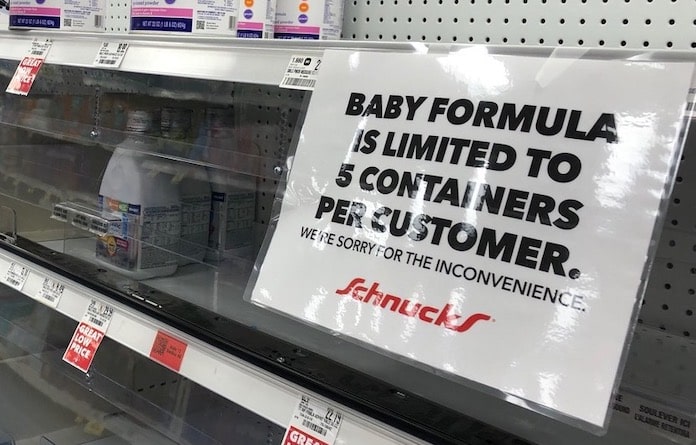Formula shortage felt locally

In the 17 years she’s been a mother, Waterloo’s Angie Hoernis has not seen anything like what she’s currently navigating with her 5-month-old daughter: a formula shortage so severe that shelves across the area – and nation – are empty.
“It’s a nightmare,” Hoernis said. “It’s something you wouldn’t imagine would happen.”
On top of a supply chain already disrupted by COVID-19, Abbott Nutrition shut the doors of one of the few formula plants in the U.S. in Sturgis, Mich. among reports that a bacteria infection stemmed from the plant. It also recalled products manufactured at the plant, which included the Similac formula Hoernis’ daughter used.
Hoernis and other families have been scouring supermarkets and drugstores for available formula, most of the time only to find more bare shelves. She said the limits stores are putting on this product seems irrelevant when supply is this low.
Recently, she traveled to five different stores across the region – even crossing the river into Missouri – and still not returning home with formula.
Now, Hoernis’ daughter is on her fifth formula type, as she did not take well to others. Hoernis is gradually adjusting her daughter to an unfamiliar formula, but recently these plans have been jeopardized.
“However, now I’m not seeing the kind we switched her to, so we’re up in the air right now. One way or another, I have to keep my daughter fed,” Hoernis said.
For some parents, trial-and-error between whatever formula they can find is not an option, adding a whole new dimension to the shortage.
“We are having several families that are struggling to find formula for their infants. The bigger concern is with those infants that take specialty formula for a medical reason – they are limited to no substitutions,” said Ginny Peter, pediatric nurse practitioner at Waterloo’s Heart to Heart Pediatrics.
Peter also explained the solution to this shortage is not as simple as breastfeeding.
“Many moms are unable to produce enough breastmilk for their baby and use formula to supplement,” Peter said. “There are also many moms that also never get the opportunity to breastfeed due to medical reasons for the mother or the baby. There are also children that are adopted or in foster care and breastfeeding is not an option.”
Hoernis, like many U.S. parents, has been enlisting the help of friends and family. Recently, a family member found a can in Indiana and shipped it to Hoernis. Another found two cans at a Walgreens in St. Peters, Mo.
When Hoernis was running incredibly low, her good friend – who has 8-month-old twins that use formula themselves – ran a sample can over to Hoernis.
“Her and I both always say ‘it takes a village,’” Hoernis said.
Peter said she recommends patients also take advantage of social media to source formula, in addition to talking to friends and family.
Additionally, she advised against the urge to “stock up” when they get lucky enough to find supply.
“As a community it is best to buy for the needs of the child currently and avoid ‘stocking up’ in order to allow for all infants to receive formula now,” Peter said.
Heart to Heart, like many other local pediatricians, has been taking steps to ensure none of their patients go hungry.
“We are in communication with our formula representatives regularly to see what samples we can receive in order to provide whatever we can to our patients,” Peter said. “We are also in contact with our pediatric gastrointestinal specialists as to what alternatives we can offer to children when there is absolutely no other option available.”
Hope may be on the horizon.
On Sunday, a shipment of formula from Europe arrived to the U.S. The shipment, agriculture secretary Tom Vilsack said, can feed 9,000 babies and 18,000 toddlers for a week, and contained formula for children with cow’s milk protein allergy.
Another shipment is expected to arrive later this week from outside the U.S., the New York Times reported.
Earlier this month, the U.S. House of Representatives passed a bill that will provide the U.S. Food and Drug Administration with funding to address the formula shortage.
“It does appear that the shipments are starting to arrive,” Peter said. “We have heard many local retailers are having formula on their shelves again and we have received a few shipments of samples to provide to our patients while they continue to look.”






